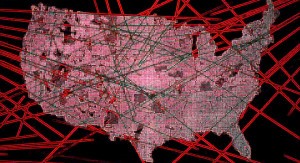I’d started writing a piece about CALEA earlier this week, other things came up, and I thought it would just be another nonstarter. The US’s Communications Assistance for Law Enforcement Act (CALEA) is designed to make it easier for law enforcement to spy on criminals, which of course no law abiding person would want to impede, it’s been used successfully to assist in the conviction of countless numbers of criminals since it was came into force in 1995. Allowing law enforcement to tap into telephone conversations, forcing telecommunication companies to both allow the wiretapping and hide the fact from the user that their conversations are being monitored. Putting the burden on the supplier to provide the required monitoring equipment to the law enforcement agencies, which meant the installation of new hardware and software across the industry.
 All modern telephone switches (PBX) now have these features built into them. But today, more and more voice communication is carried out using diverse methods of internet telephony, there are various moves to expand CALEA it IP telephony (VoIP) which weren’t previously covered. A major controversy is that by expansion is that by the very nature of building back doors into secure systems, backdoors that will quickly become targets of criminals that are already abusing our systems.
All modern telephone switches (PBX) now have these features built into them. But today, more and more voice communication is carried out using diverse methods of internet telephony, there are various moves to expand CALEA it IP telephony (VoIP) which weren’t previously covered. A major controversy is that by expansion is that by the very nature of building back doors into secure systems, backdoors that will quickly become targets of criminals that are already abusing our systems.
Is it even possible to build a backdoor into a product such as Skype, as I understand it Skype in its standard mode of person to person VoIP connection is an encrypted session between the 2 users, with no ability to listen in except at either end point. Whole products would need to change, if you forced the session to travel via a 3rd party so monitoring by authorities were possible, this would increase traffic and latency a great deal.
Now yesterday there was a major news story on the BBC which first came to my attention US ‘orders Verizon to disclose millions of phone records’ (this headline has now changed). Which exposes what later in the day proved to be the tip of the iceberg on what many would say was immense privacy abuse by the US National Security Agency (NSA) in collecting data on call session information from 10’s of millions of subscribers, not the content of the calls, but who’s been talking to who when and for how long, which was quite amusing as I’d just been reading ISACA’s take on “Big Data” just the day before. I can only think we’re talking about hundreds of millions of records a month. I don’t use Verizon, don’t know much about them, but I didn’t give it much thought, till later in the day it was exposed that this has been going on for years, and quite a number of telecoms and ISP have been supplying similar vast amounts of data to the NSA, as well as Google and Microsoft having passed on all manner of data including search queries, Microsoft apparently were the first to offer up the data in what we now know is called Operation Prism.
Personally I doubt there is anything the FBI or NSA would find interesting that I might have to say but if they’re going to start putting security holes in our systems we traditionally thought of as secure, I’m thinking that I may have to start looking using systems that are beyond their control, it’s not like there aren’t plenty of choices such as Cellcrypt and I expect we will see a lot more being developed, necessity being the mother of invention. It’s not like backdoors are the only issue, following the military leaks by Bradley Manning we are reminded of 2 things, the majority of confidentiality breaches are by insiders and all security can be bypassed.
Are the real threats, both criminals and terrorist that dumb to use insecure communications, the vast majority of the relevant court cases I have read about where IT and forensic evidence were involved were public threats or where cached information was found in browser history?
I am sure there’s a lot more to be said over the coming day, looks like interesting times ahead.